Radiant floor heating costs homeowners about $4,000 on average, with prices typically ranging from $1,700 to $6,000. Energy-conscious homeowners are always looking for ways to make their homes more efficient, and radiant floor heating systems are an excellent way to lower utility costs.
When You Should Install Radiant Floor Heating
Electric and hydronic are the two most common types of radiant floor heating systems. Radiant floor heating is suitable for new construction and renovations and is a popular choice for homes in cold climate regions because it’s highly efficient.
Energy Efficiency and Comfort
Even if you don’t live in a cold climate region, having a nice, warm floor on a chilly morning makes radiant floor heating an attractive option, especially for bathrooms and kitchens.
Radiant floor heating is more efficient than forced air heating because you don’t lose heat through the ductwork. All the heat distributed by radiant floor heating provides heat directly where needed.
Hydronic radiant floor heating systems powered by natural gas are the most efficient. Water is heated in a boiler and pumped through pipes under the floor. There is even greater energy efficiency when you combine hydronic systems with solar-powered water heaters or geothermal heat pumps.
Suitable Flooring Types
You can use many types of flooring with radiant floor heating. However, some materials transfer heat better than others.
Your radiant floor heating system will be more efficient if you choose a material with good thermal conductivity. You also want to ensure it’s not too thick and won’t expand or contract. Ceramic, porcelain, natural stone, and concrete floors are considered the best choices for radiant floor heating, but you can also use laminate and vinyl.
The Benefits of Radiant Floor Heating
Radiant floor heating is one of the best ways to heat your home. It offers several benefits over other heating choices.
Comfort and Even Heating
Radiant floor heating is more comfortable because the warm air rises evenly from your floor and is distributed throughout the room at floor level. According to the law of thermodynamics, heat follows cold. Once the heat is conducted from the wires or pipes in your floor to the air in your home, it spreads out in all directions.
Many homeowners enjoy how clean radiant heat is. Because it doesn’t require blowing air around, you’re less likely to have problems with dust and allergens.
Energy Efficiency
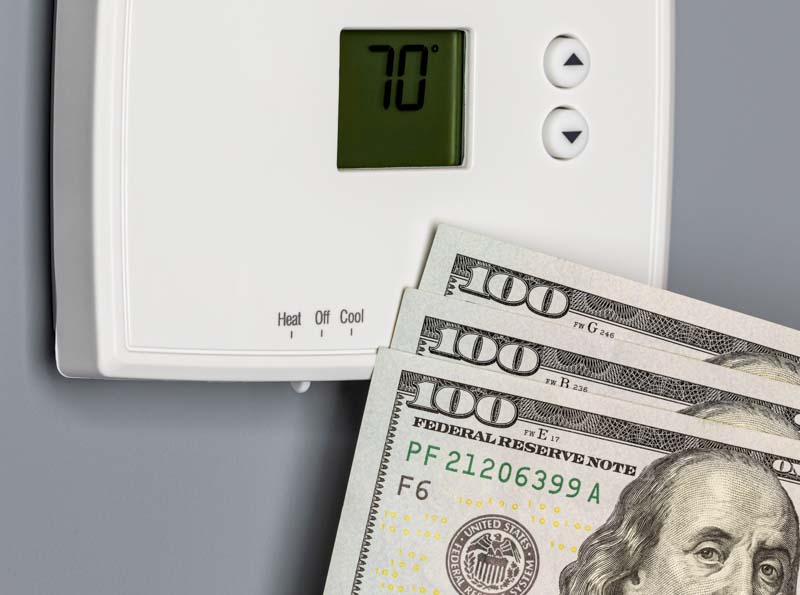
Many homeowners save about 10 to 30% on their heating bills using radiant floor heating. It’s important to note that radiant floor heating is more efficient in well-insulated homes with low ceilings.
The heat source is another factor that influences the energy efficiency of radiant floor heating systems. You can significantly lower the radiant heat cost per month using alternative energy sources like solar and geothermal.
Space Saving and Aesthetic Benefits
One of the most significant benefits of radiant floor heating is its unobtrusive. Electric systems are almost imperceptible. The boiler is in a utility room or basement with hydronic systems, so it takes up very little space. Both types operate quietly and cleanly without heat ducts.
Factors in Calculating Costs of Radiant Floor Heating
Here are a few more factors to consider when calculating the costs of radiant floor heating.
Types of Radiant Floor Heating Systems
The two main types of radiant floor heating are electric and hydronic, but you should also consider alternative energy sources like solar, geothermal, and propane.
| Type of radiant floor heating | Description |
| Electric radiant heating | Uses electric cables or mats installed in mortar beneath the flooring. |
| Hydronic (water-based) radiant heating | Uses pipes filled with warm water to heat the floor. This type of system requires a boiler as a heat source. Many systems use natural gas, which is cost-effective. |
| Geothermal radiant floor heating | Uses geothermal heat pumps to heat water in hydronic systems. |
| Solar radiant floor heating | Uses solar thermal panels to heat water for hydronic systems. |
| Propane radiant floor heating | Similar to natural gas hydronic systems. |
Home Size and Layout
Heated flooring costs vary depending on your home’s size and layout. The average price of radiant floor heating per square foot is $11, including labor and materials, ranging between $6 and $25.
| Size of building | Square feet total | Average cost |
| 30 x 40 | 1,200 | $13,200 |
| 40 x 40 | 1,600 | $17,600 |
| 40 x 50 | 2,000 | $22,000 |
| 40 x 60 | 2,400 | $26,400 |
Installation Complexity
The complexity of installation influences the cost. The more specialized the equipment, the higher the material and labor costs. Hard-to-access floors, including retrofits, will also have a higher installation cost.
Material Costs
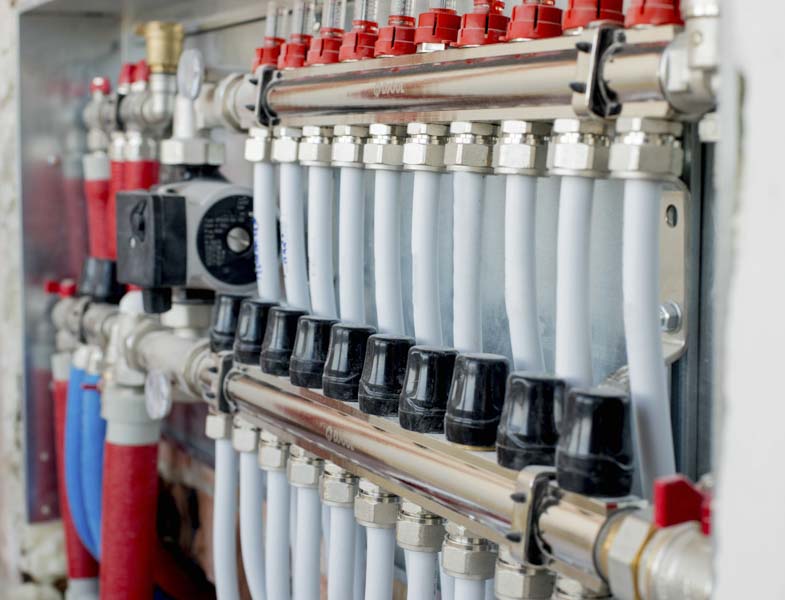

The type of materials used influences the overall costs. The type of system will determine the cost of materials, including piping or wiring. Flooring materials also impact the cost of radiant floor heating.
Additional components for your system, including manifolds, mixing valves, and zone valves, further impact the cost of your radiant floor heating system.
Additional Radiant Floor Heating Costs and Considerations
Here are additional radiant floor heating costs to consider.
Thermostats and Control Systems
Electric radiant floor heating is much more straightforward than hydronic types. The cost of radiant heating goes up when you add more components like thermostats and control systems.
Maintenance Costs
There are fewer maintenance costs associated with radiant floor heating than almost any other home heat source. If a professional HVAC installer or plumber installs your system, you should have them inspect it annually to ensure everything is working properly.
Flooring Repairs and Replacement
If you’re retrofitting your home for radiant floor heating, it may require replacing floors, which adds significantly to your project.
Flooring costs vary greatly by type, but on average, you can expect to pay about $7 per square foot for flooring. Engineered hardwood flooring, which works well with radiant floor heating, can cost up to $21 to install.
Insulation and Heat Loss
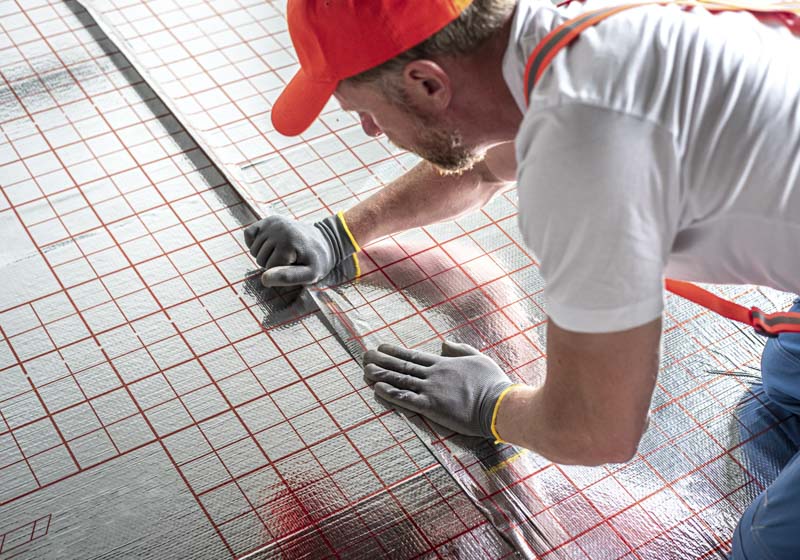

Insulation is critical for preventing downward heat loss. Heated concrete floor costs typically include sheets of polystyrene insulation and another layer of plywood. These products represent about $1.00 to $2.00 per square foot of the overall cost.
Types of Radiant Floor Heating and Prices
Hydronic and electric radiant floor heating systems share many of the same benefits. Even though they are quite different systems, they have similar installation and operation costs.
Hydronic Radiant Floor Heating
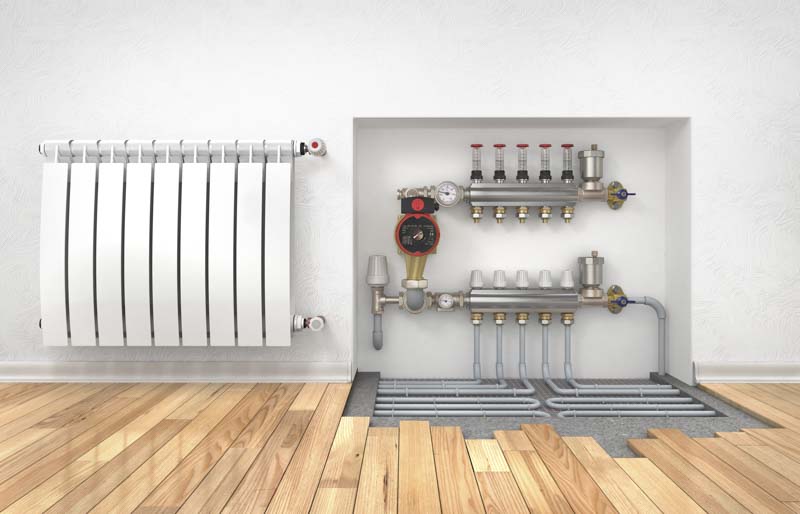

Hydronic heating systems cost an average of $19,000 to $48,000 for whole-house installations. The cost to install radiant floor heating goes up with the size and complexity of the system.
Electric Radiant Floor Heating
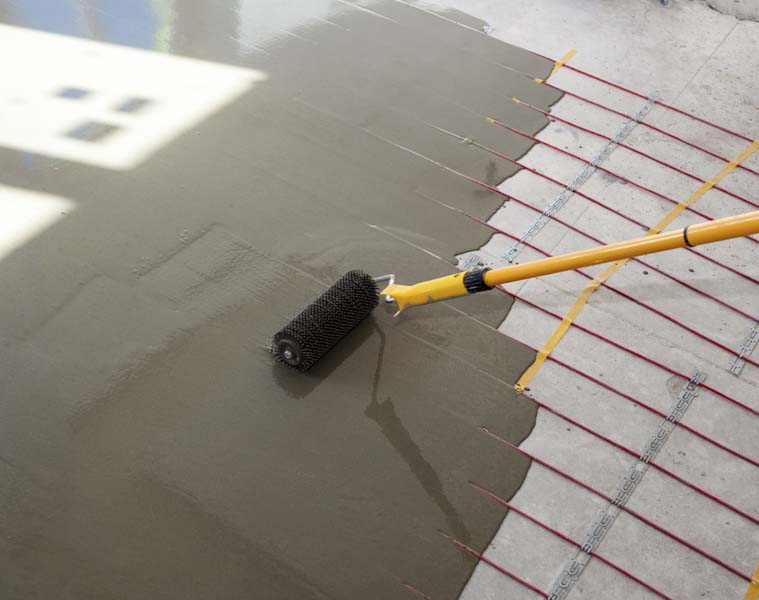

Electric underfloor heating costs $19,000 to $36,000 for whole-house installations. Materials for electric radiant floor systems are about $10 to $15 per square foot, and installation adds about $5 to $10 to the overall cost.
Comparison of Costs and Efficiency
Hydronic and electric radiant heat systems are similar in price, and it often comes down to what’s easiest to install and whether you have natural gas infrastructure available to power a hydronic system. Both systems cost about $1.50 to $7 per day to operate.
Discover the factors that influence heated floor prices per square foot.
Typical Price Ranges
Underfloor heating costs typically range from $6 to $20, with most projects costing anywhere from $1,700 to $6,000.
| Type of radiant floor heating system | Cost per square foot |
| Electric | $8 to $15 |
| Hydronic | $6 to $20 |
| Solar | $18 to $25 |
| Geothermal | $7 to $17 |
| Propane | $6 to $18 |
Sample Cost Calculations
Here are sample cost calculations for radiant floor heating applications.
| Area | Price range |
| Hydronic floor heating cost for 8 x 10 bathroom | $480 to $1,600 |
| Electric radiant heating cost for 12 x 12 bedroom | $1,150 to $2,200 |
| Propane radiant floor heating cost for 15 x 15 living room | $1,350 to $4,000 |
| 40 x 60 geothermal heated garage floor cost | $16,800 to $41,000 |
Speaking of garage floors, check out our guide to the 7 best garage floor coatings!
DIY Heated Flooring Installation vs. Hiring a Professional
Professional installation of radiant flooring heat systems is fast, usually taking less than a few days. If you do it yourself, you can save a lot of money, but it’s likely to take much longer. Learn more about the pros and cons of DIY installation versus hiring a professional.
Pros and Cons of DIY Installation
Whether installing radiant floor heating in your home or garage, you can save money with DIY installation. Slab heating costs can be reduced significantly with a DIY approach, and you can enjoy working at your own pace and seeing the results of your labor.
On the other hand, radiant floor heating installations can be complex, so there is a greater potential for errors. Poorly installed systems may not function properly or efficiently.
Once you have a heated garage floor, you might want to finish it off with an epoxy. Find out how much it costs!
Hiring a Professional: Costs and Benefits
Professional radiant floor heating installers bring years of experience to the table. They will ensure a well-planned system and quality installation.
Safety and Warranty Considerations
Improperly installed systems may lead to safety considerations, including electrical, overheating, and fire hazards. Mistakes can also lead to water leaks, voided warranties, and uneven heat distribution.
Radiant floor heating equipment is expensive, and for many, it’s not worth risking it to enjoy small savings on labor with DIY installation.
How to Save Money on Radiant Floor Heating
Follow these tips to save money on radiant floor heating costs.
Energy Saving Tips
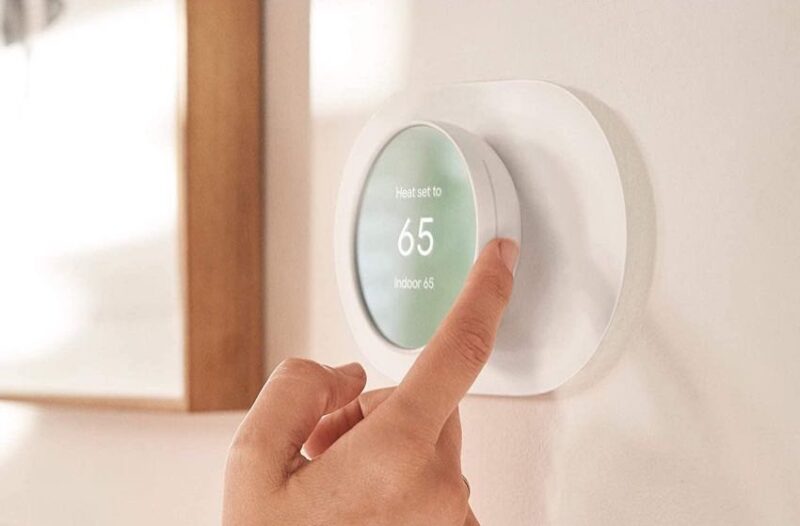

Radiant floor heating costs an average of $1 to $5 per day to operate. Save money on your energy bills with these tips:
- Lower your thermostat setting by just a few degrees.
- Use zone controls to heat only the area you need.
- Conduct an energy audit of your home and add insulation where needed.
- Consider adding an alternative energy source, like solar or geothermal.
Budget-Friendly Flooring Choices
Radiant floor heating works well with any type of flooring, and one of the easiest ways to save money on installation is to choose a budget-friendly flooring option. For example, compared to the cost for a heated tile floor, you can get a laminate floor at a lower cost.
Government Rebates and Incentives
The Inflation Reduction Act set up a Home Owner Managing Energy Savings (HOMES) program, which gives states money to offer tax incentives for energy-efficient modifications, including radiant floor heating. Check with your accountant or state tax department for more information.
There are other ways to heat things! Explore our Best Garage Heaters and Best Electric Garage Heater Reviews lists.
5 FAQs About the Costs of Radiant Floor Heating
How Long Does Radiant Floor Heating Last?
Radiant floor heating lasts about 30 to 50 years, depending on the type and quality of the installation. Electric systems have a slightly shorter lifespan of 30 to 40 years compared to hydronic systems, which typically last about 30 to 50 years.
Will Radiant Floor Heating Increase My Home’s Value?
Radiant floor heating makes your home more comfortable and easier to heat, increasing your property’s value. It can also make your home more attractive to buyers, giving it a better chance of selling at the highest possible price.
Can I Retrofit My Existing Home with Radiant Floor Heating?
If you can access the floor joists, radiant floor heating can be installed under an existing floor. You can also remove the existing floors, install an above-floor system, and replace the flooring, but this method is usually cost-prohibitive.
What Maintenance Does Radiant Floor Heating Require?
Radiant air heating doesn’t have fans and ducts, so you don’t have to change filters or clean your ductwork, but there are a few maintenance tasks. Yearly service by an HVAC professional is recommended to ensure the system operates at the right pressure. You should also regularly check the condition of pumps and valves.
Are There Financing Options Available for Radiant Floor Heating?
Radiant floor heating can be more expensive than other types of heating, but it will pay for itself in the long run. To cover the upfront costs, several financing options are available, including home improvement loans, home equity loans, and installer financing. You should also research tax incentives for radiant heating.





